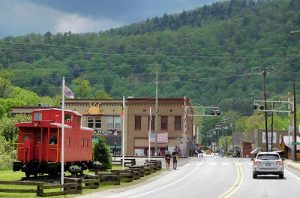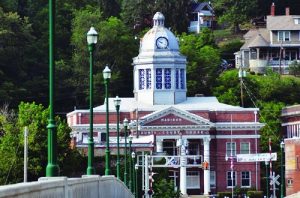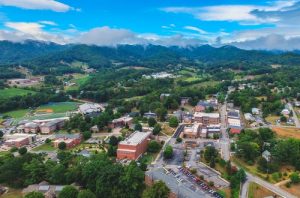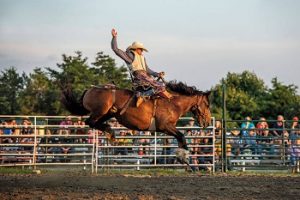Not only did Madison County musical families produce talented musicians, but it seems that the soil itself seemed to create more. Among them are Ralph Lewis, Arvil Freeman, and Roger Howell. You can catch them showcasing their talents at various venues throughout the county–Thursday night Blue Grass Jam at Zuma, or at one of the Arts Council Concerts (especially the annual March Fiddler’s Tribute), or one of the annual festivals–Bluff Mountain in June or Bascom Lamar Lunsford Festival in October.
RALPH LEWIS

Photo by Pat Franklin
Ralph Lewis has been playing music and singing in his unique style since his early childhood here in Madison County. His fame stretched far beyond the county borders as he appeared on the television show Hee Haw and at the Grand Ole Opry, most notably with Bill Monroe and his Bluegrass Boys. With them, he also toured Europe, Japan, and through the US. Although Lewis began his career playing with his brother and then with other groups, he now plays as the Sons of Ralph joined by his sons, Martin and Don Lewis, Cousin Steve Moseley, and the “other brother” Ozzie Orengo, Jr. In 2001, Ralph received the Bascom Lamar Lunsford Award which is given annually to “individuals who have made significant contributions to the folk traditions in the southern mountains.”
Ralph Lewis is a remarkable musician who is an absolutely wonderful performer with expertise in the guitar, mandolin and fiddle
—Interview with Joe Penland, July 2010
ARVIL FREEMAN

Photo by Pat Franklin
Another of those famous fiddlers is Arvil Freeman. Freeman was born in the area known as Paw Paw and made his first professional appearance in 1950 on a radio station in nearby Bristol, Virginia, at the age of 14. He toured for a while in the 1960s but has remained close to home since then. In 1974, 1993, 1994, and 1995, he won the fiddle contest at the Mountain Dance and Folk Festival. Throughout the 1980s Freeman played five nights a week in the Marc Pruett Band, at Bill Stanley’s Barbecue and Bluegrass in Asheville and later performed regularly as a member of the Stoney Creek Boys, the house band for Asheville’s Shindig on the Green. He was one of five fiddlers chosen to highlight North Carolina fiddle styles on the PBS’ Folkways series hosted by four-time Grammy-winning local musician and storyteller David Holt.
VIDEO GALLERY
Arvil Freeman is one of the kindest, sweetest people you’ll ever meet. He was born “poor as dirt” and grew to be one of the best all-around musicians, although his best talent is on the fiddle. The best compliment I ever heard paid to Arvil was when Ralph Lewis (of Sons of Ralph) told him that he was making a record and Arvil couldn’t make it so they had to use Vassar Clements (a Grammy-award winner who has been dubbed the Father of Hillbilly Jazz).
—Interview with Joe Penland, July 2010
ROGER HOWELL

Photo by Pat Franklin
Tommy Hunter was the number one mentor to Roger Howell. It was from Tommy Hunter that Roger Howell truly learned to play and was given the experience to play in front of large crowds. Roger grew up on an appropriately named road–Banjo Branch–although he first played the guitar. As Roger described it, “I was just a local boy and played like many other people do in the mountains. After awhile you pick up stuff, and it’s no big deal. Everyone done that around here. They’d farm during the day and they’d play by night.” He has appeared on scores of albums, recording with his friend Doug Phillips on the ground-breaking album Blue Ridge Mountain Music in 1991. As he continued to perfect his bowing style, he also turned to collecting, producing, and documenting many field recordings of local fiddlers, including over 150 tunes from the late Madison County fiddler Woodrow Boone. The Appalachian Archives at the Ramsey Center, Mars Hill College,will be the home of this collection.
VIDEO GALLERY
Roger’s talent is amazing but even more valuable is his contribution to preserving the music of Madison County.
—Interview with Joe Penland, July 2010




